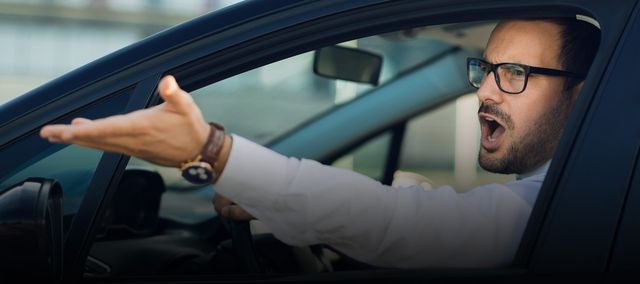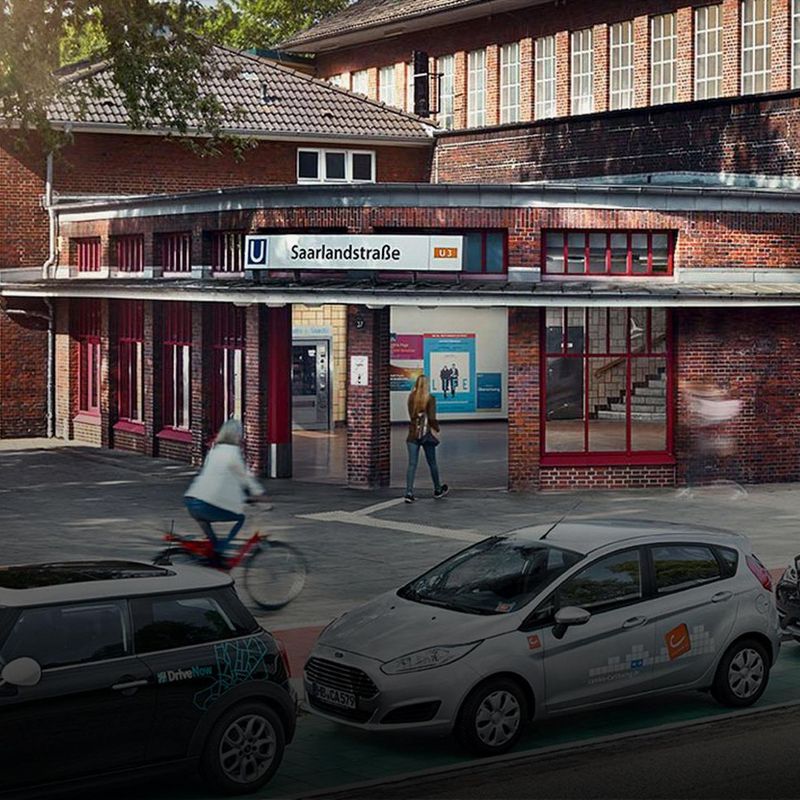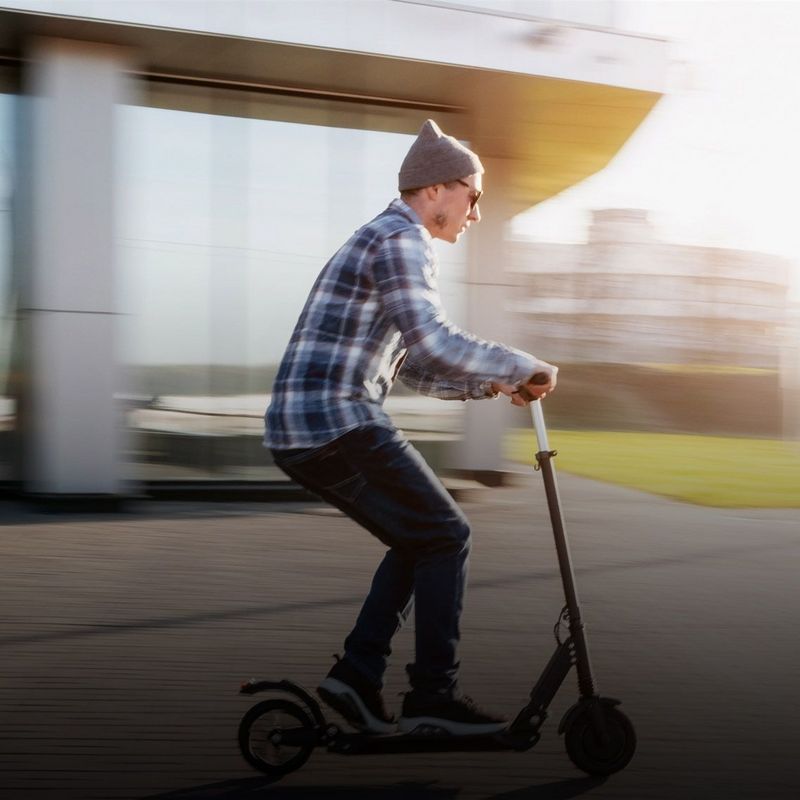21 November 2019
We all know the kind of thing: someone cuts us up, someone else overtakes us on the inside, or we’re forced to wait at the traffic lights because the driver in front was asleep when the lights turned green. There can’t be many areas in our life that spark conflict as readily as traffic situations. Christian Müller, traffic psychologist at TÜV NORD, explains why we so often see red behind the wheel, how we can deal with our own frustration and that of others, and how it is that we take road traffic conflicts much too personally.
#explore: What are the main issues and questions that you have to deal with as a traffic psychologist?
Christian Müller: The thing I get to hear about most as a traffic psychologist is the behaviour of road users. We also deal with cyclists, train drivers and bus or taxi drivers, but the vast majority of our clients are motorists – particularly those whose driving behaviour is an obvious cause for concern. Most of the time you don't have to worry about the others.
Why do we so often see red when we’re driving?
It really is the case that there are a few conditions which make it harder for nearly all road users to behave appropriately. After all, being in a car is like being in a closed cage which allows only limited communicate with others: It’s easy to miss someone’s else’s apology. Hand gestures and flashing your lights can be interpreted as either an attempt to tell someone something or as a form of aggression. So there’s an awful lot of potential for misunderstandings, and we have no recourse to the medium of language to sort incidents out. And we all too often interpret road traffic incidents as deliberate acts and take them personally: Someone takes something that’s mine, and there’s no way I’m going to let it pass. This is of course highly irrational. Millions of strangers who encounter each other on the road are convinced that the other person’s behaviour has something to do with them.
"We all too often interpret road traffic incidents as deliberate acts and take them personally."
So why do we take road traffic situations too personally?
Well, because in a way we haven’t learnt not to. The way we are socialised involves personal contact with other people – from the parental home to kindergarten and school. This is something we automatically transfer to road traffic situations. But the difference is that we’re moving in a highly artificial space that is actually utterly impersonal.
Why can frustration and anger so easily turn into aggression, especially behind the wheel?
When we’re in a car, we may be moving around in public, but we also feel protected by the steel cage around us and a certain degree of anonymity. This can mean that we aren’t as inhibited as we normally are in everyday life. Meaning that we do things that we wouldn’t dare to do if we were face to face with someone. What’s more, behaving badly often doesn’t have any consequences: Insulting or coercive behaviour like tailgating or braking sharply in front of someone is only very rarely prosecuted. In other words, people with bad driving habits can act out their impulses - letting off steam and putting other people “in their place” - without being punished for doing so. What happens is that they feel encouraged to act in that way.
How should we deal with our own anger on the road?
Swearing in the car is generally harmless, so there’s no real need to stop doing it. However, if I find that such emotions are affecting my driving behaviour, for example by making me drive too fast or too close to the car in front, a useful first step is to recognise how irrational it is to get angry. After all, there’s a good chance that the other guy didn’t mean to cut me up. If I find myself overtaking in a place with poor visibility because someone has been cheeky enough to push in in front of me, I’m putting both myself and others at risk. If this sort of thing happens a lot, and I can’t help myself, I should really think about what’s behind it and seek out support. But that doesn't necessarily mean going straight to a psychologist. Relaxation techniques can often help. After all, how I behave in traffic often has something to do with how close I am to my personal stress threshold. If I can relax in my everyday life, I’ll be able to deal more easily with frustration.
What can you specifically do to relax more?
You might think about yoga or autogenic training. You can also learn simple breathing techniques via the Internet. And you can then practise them in your car. Taking a deep breath, however cliched that may sound, can help you cool down behind the wheel. Just concentrating on your breath for ten seconds without losing sight of the traffic can get you out of the vicious spiral of aggression. But if you’ve often found yourself in serious confrontations on the road and you can’t control yourself, even with such techniques, then you really should seek out a psychotherapist. If possible, before you end up in an accident or lose your licence. This applies especially to the serious cases, of course. In such cases, the person concerned will usually have been told by friends and relatives but also by the police and the licensing authorities that there’s something amiss with their driving behaviour.
How do I deal with insults from other road users?
You should always try to avoid being provoked. As a traffic psychologist, I also deal with cases where a conflict over a parking space, for instance, ends in a serious injury. And experience dictates that the most extreme cases of bad driving behaviour tend to result from mutual provocation spiralling out of control. If you respond to being insulted by hurling an insult yourself and are unlucky, you may come up against someone with a seriously impaired ability to rein in their impulses. You might end up with them braking sharply in front of you or even threatening or assaulting you at the next traffic lights. These are, of course, the most exceptional cases. And what this means is that the wise course of action is to give way. Because if things escalate, both parties will always end up losing. This isn’t about letting traffic yobs get away with everything, of course. Obvious and serious bad behaviour, such as braking dangerously on the motorway, can and should be reported. If for no other reason, then to ensure that someone prone to repeated offences is taken off the road so that they can’t endanger other road users for years to come.
"You should always avoid rude gestures like giving someone the finger or yelling insults through a car window."
When you’re on the road in a town or city, you often feel tempted to use words or gestures to tell the other person what you think of them - for instance, if a driver stops on a cycle path in front of you. How useful is it to “enlighten” people in this way?
The belief that you can teach someone by hand signals or verbal expressions of displeasure is also highly irrational. There are of course always situations in which someone has overlooked something, and that can be pointed out to them with a gesture or verbally. Often, however, people in traffic situations don’t share the same perspective, and it’s unlikely they’re going to let others put them right. What’s more, there are enough people who refuse to admit they were in the wrong, and such people aren’t going to accept an insult. Expressing your shock by shaking your head or saying less provocative things like “This is a cycle path” is without doubt relatively more acceptable. But you should always avoid rude gestures like giving someone the finger or yelling insults through a car window.
More and more parents are now driving their children to school. Is that really making them safer, or does it just mean that they aren’t learning how to deal with traffic situations?
There’s no clear answer to this; after all, highly individual factors are always at play: There are more and less dangerous routes, and children of the same age are not always necessarily at the same stage in their development. But what are problematic, of course, are the kinds of situation you can observe more and more frequently right outside schools. Situations where parents drive too fast because they want to drop their kids off quickly so they can get to work on time, or in which too many stopping cars just unleash chaos. These are both dangerous in road safety terms and environmentally nonsensical. There are alternatives: kids who live close together can club together to form walking buses, especially if they have to walk for longer than 15 minutes - preferably with older children or in the company of an adult. If the parents take turns, this is a safe and workable solution for everyone. Ultimately, however, it’s a matter of enabling the child to manage the journey to school on its own, in line with its level of development.
Did our parents or grandparents use to navigate urban road traffic differently than today's generations of children?
There are two observable developments here: it’s a fact that the volume of urban road traffic has increased in recent decades, which has also increased the risk potential. At the same time, many parents are now more reluctant for their kids to take risks and show the kind of extreme mothering tendency that you just didn’t get 20 years ago. Of course, you want to protect your child as fully as you possibly can. But if you think that you can control every situation and eliminate every source of risk, you’re bound to fail. Parental smothering brings kids up to be dependent. On the other hand, doing things to support the individual responsibility of children or young people will contribute to making them safer on the road.
As the nights draw in, Christmas celebrations are just around the corner. The question which often arises is this: do I drive, or don’t I? How will I get home safely from the party?
If you’re likely to drink alcohol at the Christmas party, then the safest option is not to drive to work. Then you’ve already eliminated the risk of getting behind the wheel in a drunken state because there’s no taxi in sight or the next bus isn’t due for another half an hour. The golden rule here is to plan both parts of the journey in advance: For example, if you go to work by public transport, perhaps your partner will be able to pick you up after the party; either that or you book a taxi in advance or make an arrangement with a colleague. There’ll often be someone in attendance who doesn’t drink and will be happy to chauffeur people. But what is incredibly important is that you shouldn’t take some other vehicle as an alternative to driving if you’re planning to go home drunk. Don’t get on a bike or an electric scooter of the sort that you can now find on every street corner in big cities. When you’re under the influence of alcohol, both your sense of balance and your reaction times are severely impaired, making you a danger to yourself and to others. And, in the eyes of the law, an e-scooter is an electric vehicle. In other words, the same blood alcohol limits apply as they do to car drivers. At the recent Oktoberfest in Munich, about 250 e-scooter drivers were stripped of their driving licences.
ABOUT
© TÜV NORD
Christian Müller is a traffic psychologist and head of the Medical-Psychological Institute of TÜV NORD in the Rhineland. Since his degree thesis at the University of Bonn 23 years ago, Müller has been working to improve road safety for all road users: “You always have to see the person behind the traffic yob. Even a person with a history of violence or drugs can, with help, sort out their behaviour and return to being a safe road user.”



